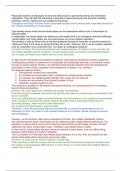Physicalist theories of philosophy of mind are behaviourism, type-identity theory and eliminative
materialism. They all hold that everything is physical or supervenes upon the physical, including
properties, events, objects and any substance that exists.
Throughout this essay I will show how a physicalist account of the universe fails, especially because of
the multiple realisability of mental states.
Type-identity theory holds that all mental states can be redescribed without loss of information as
physical states.
In explanation, all mental states are identical to brain states (this is an ontological reduction) although
‘mental states’ and ‘brain states’ are not synonymous (so not an analytic reduction).
This position is held by Smart and can be best explained through an example: to say that someone’s
c-fibres are firing is the same as saying that they are in pain. However, this is not an analytic reduction
such as ‘a bachelor is an unmarried man’, but rather an ontological reduction.
According to Smart, this should be preferred over dualism because of Ockham’s razor principle (‘do
not multiply identities beyond necessity’), as type identity theory can predict everything that dualism
can, but with one entity (brain) rather than two (mind and brain).
A major issue to this theory is provided by Chalmers’ philosophical zombies (p-zombies) argument.
A philosophical zombie is a person who is physically and functionally identical to an ordinary human,
but has no qualia (namely intrinsic, non-intentional phenomenal properties that are introspectively
accessible; in other words, properties of the experience of objects - e.g. redness).
His argument goes as follows:
1. Philosophical zombies are conceivable
2. If p-zombies are conceivable, then p-zombies are metaphysically possible
3. If p-zombies are metaphysically possible, then qualia are non-physical
4. If qualia are non-physical, then property dualism is true
5. Therefore, property dualism is true
This would be a problem for all reductive physicalist theories, as it shows that there is something
beyond physical properties.
However, we could object that p-zombies are actually inconceivable.
If we had enough knowledge, we would know that the only reason p-zombies seem conceivable is that
we are confused
Once we understand that qualia are physical things, then the existence of a p-zombie is inconceivable.
That is because it would be like saying ‘Imagine something that is physically identical but isn’t
physically identical’, which would be self-contradictory.
So, we shall infer that Chalmer’s argument fails.
Therefore, it looks like the dualist argument actually fails to counter the physicalist account of
philosophy of mind, as it relies on the possible existence of p-zombies, whose concept is however
self-contradictory.
However, we find another major issue presented by Putnam, the multiple realisability problem.
She claimed that the same mental state can be realised through multiple different behaviours. For
example, an octous and a human do not have the same brains or brain states, but they can both
experience the same mental state of pain. Therefore, type identity theory is false.
In other words, mental states like pain cannot be reduced to brain states, such as c-fibres firing,
because mental states are multiply realisiable.
This is a problem for mind-brain type identity theory because if it is true, then we cannot have the
same mental state without having the same brain state.
However, we could counter that this objection actually fails.
That is because in both the octopus and the human we find the same fear response. Perhaps since
the octopus is physiologically different from a human being, its mental state will be slightly different,
maybe vary in name.




